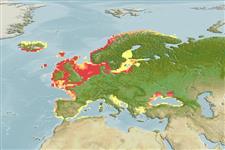Preferred temperature (Ref.
115969): 7.3 - 13.5, mean 10.2 (based on 738 cells).
Phylogenetic diversity index (Ref.
82804): PD
50 = 0.5156 [Uniqueness, from 0.5 = low to 2.0 = high].
Bayesian length-weight: a=0.00229 (0.00164 - 0.00321), b=3.07 (3.00 - 3.14), in cm Total Length, based on LWR estimates for this species (Ref.
93245).
Trophic level (Ref.
69278): 3.1 ±0.1 se; based on diet studies.
устойчивость к внешним воздействиям (Ref.
120179): средний (среднего размера), минимальное время удвоения популяции 1.4-4.4 года (K=0.45-0.77; tm=1-3; tmax=7).
Prior r = 1.02, 95% CL = 0.67 - 1.53, Based on 8 stock assessments.
Fishing Vulnerability (Ref.
59153): Low vulnerability (23 of 100).
